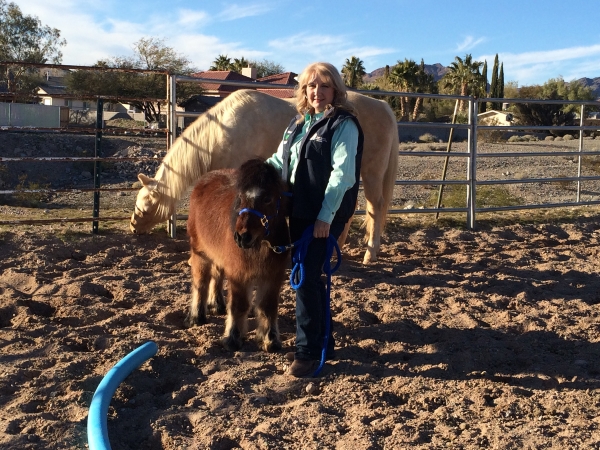
When I lived in California and things got a little stressful, I headed for the barn in our backyard.
There, my husband and I kept our stable of horses.
We would, and often did, spend hours there cleaning the stalls, feeding the horses, brushing them, scratching their ears and going for the occasional ride.
They were like big puppy dogs. They would follow us around, play games with us and were good friends.
I even had a 1,200-pound lap pony who would trap me in the corner of the stall and wrap his neck around me so that we could hug. It was his way of putting his head in my lap so I could pet his ears and mane, sooth his soul and put him to sleep (something I had done when he was less than 12 hours old and continued to do for as long as he was with us).
We used to joke that spending time with the horses was therapeutic. When we were with them, we could think about very little else. It helped us clear our minds of the issues and problems of the day.
Seems we weren’t that far off in our thinking.
There is a new nonprofit in Boulder City that wants to help people “break free” from any mental or emotional issues that are holding them back, and it plans to do it with the help of equine therapy.
Breaking Free Therapies will use two-legged and four-legged professionals to help people improve their mental and emotional well-being. It follows the model from the Equine Assisted Growth and Learning Association, according to Sarina Rohrig, founder and executive director of the nonprofit.
The program pairs a mental health professional with an equine specialist, using interactions with a horse to provide immediate feedback and open a channel for communication.
According to Sarina, the program borrows many of the same principles as animal therapy at hospitals and assisted living facilities. The animal’s presence has a calming effect.
Additionally, the horse’s social nature and personality often mirrors that of the client, providing greater insight for the therapist, she noted.
For example, a horse may be brought to the arena ungroomed, which would help a person think about personal hygiene issues. Or, it might be shy and stay away from others in the group, helping them consider social situations.
Currently, Breaking Free is based at the Boulder City Horseman’s Association, where Sarina boards her horses. In addition to her own animals, she said she has access to nine others for the therapy sessions.
All of the horses have been “desensitized to things that will spook or scare them, but the horse gets to be a horse,” Sarina said.
Leia Morrison, president of Breaking Free Therapies board of directors, said she was drawn to the organization by Sarina’s drive and passion. She said she comes from a family of horse people and is helping raise a grandson who has Asperger’s syndrome.
“I have seen it in action,” she said of the therapy model. “The horse is an emotional-based animal and it has the inate ability to pick up what we feel.”
The mental health professional must be trained and certified as you would expect any professional therapist. Basically, the therapist would be taking his or her practice out of the office and into the field for the sessions.
To be certified, the equine specialist must have at least 6,000 hours of experience working with horses, plus 100 hours of continuing education in topics such as ground work experience, horse psychology knowledge and/or ability to read horse body language/nonverbal communication, according to EAGALA.
There also are two three-day training courses on the fundamentals of EAGALA’s model.
Currently, the program has not been put into action in Boulder City. Sarina said she is still ironing out details and making agreements with local therapists and organizations that would have people in need of equine therapy.
She hopes to help veterans suffering from issues such as post-traumatic stress disorder, as well as children, youths and women with behavioral or emotional issues.
But Sarina and Leia believe in the program and they have lofty goals. Plans are already in the works to expand into the Las Vegas Valley, Leia said.
While they work to get the agreements in place, they are also working to raise funds to cover the costs of keeping the horses. Sarina estimates it costs her between $6,000 and $7,000 a year to board and care for her three horses, and it will cost roughly $15,000 a year overall for the nonprofit to operate and pay its insurance.
More information about Breaking Free is available at breakingfreetherapies.org.
Hali Bernstein Saylor is editor of the Boulder City Review. She can be reached at hsaylor@bouldercityreview.com or at 702-586-9523. Follow @HalisComment on Twitter.